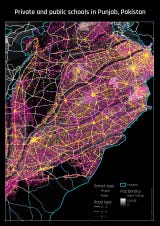A bunch of questions on “The Privatization Debate”, both on LinkedIn and through DMs. Thoughts below.
WAIT. WHAT? Public school teachers earn MORE than private school teachers? I don’t believe that.
Let me be clear about this before readers point out that their own country is different. In India and Pakistan, where researchers have collected these data very carefully, it is true that salaries for teachers in public schools are 4 to 6 times higher than for private school teachers even without counting benefits and job security. The differences are so large that the distribution of wages do not even overlap—the lowest paid teacher in the public sector earns more than the highest paid in the private sector.

And other countries? I am not sure. Justin Sandefur has put together a very informative blog on teacher salaries around the world. There, he makes the point that in poor countries, teacher pay as a fraction of GDP is much higher than in richer countries—and that makes sense because there should be a larger skills premium when skills are scarce.
The point worth stressing is that teachers are part of the civil services, and therefore, there is nothing special about teachers being paid more in the public sector—janitors, gardeners, nurses etc. are all paid more if they are permanent employees in the public sector. This is question of general structures of public compensation. It is not specific to education.
Conversations with the Public Pessimist show that you are not in favor of the private sector. Comments?
Rather than my planned slow reveal of a Higashino detective novel (any "devotion of suspect X" fans out there?), here is a paragraph from Post #4 that clarifies my position.
The Public Pessimist: I have always read the stuff you wrote as saying that we should focus on private schools…now it turns out that you are more of a public-wallah?
Me: No and Yes. In the sense that No, I am not a public-wallah to the extent of wanting to regulate the private sector out of existence. All my work suggests that parents have a fairly good idea of what they want from schools and whether they are getting it. Sure, there are always cases where parents do not have their children’s best interests in mind or are unable to separate the marketing gimmicks of private actors from the true value of the schools. On average however, I am quite comfortable saying that we are better off assuming that private schools add value to the communities that they locate in.
And yes, I *am* a public-wallah because I am increasingly convinced that public monies should not be used to support private schools—although it can be used to support schooling in a way that includes public and private schools in a manner that I will make precise in subsequent posts.
It will take some work to reach that point though…..
If a large number of private schools do better than public schools, even if we make factor prices the same for both, won't that make private still better on average?
Keep factor prices aside for the moment, since it may confuse the main point, which is that the answer to the question depends on precisely what policy we are interested in. I considered two policies in my article--closing down public schools and providing vouchers for private school attendance--and showed that in both cases, the average performance is not informative for the policy.
Isn't a huge constraint on private schools that they've got to hire less trained, less qualified teachers, and if this constraint was removed, their performances would also improve (even if not substantially) -- and consequently make them more productive?
Unclear! In my paper with Natalie Bau we show that (like in other countries) we are absolutely dismal at predicting what makes a good teacher!
You point out that lower prices aren't really sustainable in the long run, and eventually private players will run into the same headwinds that raise factor prices that public schools did. Isn't that in a very narrow case of when the gov hands over public schools to private providers?
Yes! Great point! That is exactly right--handing over government schools to private providers saves costs *only* if we want to avoid a democratic consensus around compensation. But the same point holds when governments give vouchers for private schools. The experience in India has been that once public monies are involved, private players need to play by the public compensation rules and hiring norms, at least once they are taken to court.
But the policy consequences of scientific work may not entirely be within the reach and control of economists. The data may suggest a particular finding, but how that data is interpreted, applied, or translated into policy is so much more complex, no?
Absolutely! and it must not be within the reach and control of economists. Virtually every policy creates winners and losers and it should be firmly outside the control of the economists to adjudicate among those different populations. What we should be doing is our best to show *who* the winners and losers from a policy are and communicating our research clearly to a broader audience if we think that it should influence a policy debate.
And to finish, here is an absolutely stunning image from Asjad Naqvi of public and private schools in Punjab, Pakistan, which is the 12th largest schooling system in the world. The private schools, in yellow, are much more likely to be located in cities and along highways whereas more remote villages are primarily served by public schools. So, if households are unwilling to travel outside the village for schooling (and all the evidence shows that the “distance penalty” is huge, the value of a public school is *not* the test scores of the children in the school, but the test scores that would result if that school was shut down.




